North Surrey Secondary 24-25
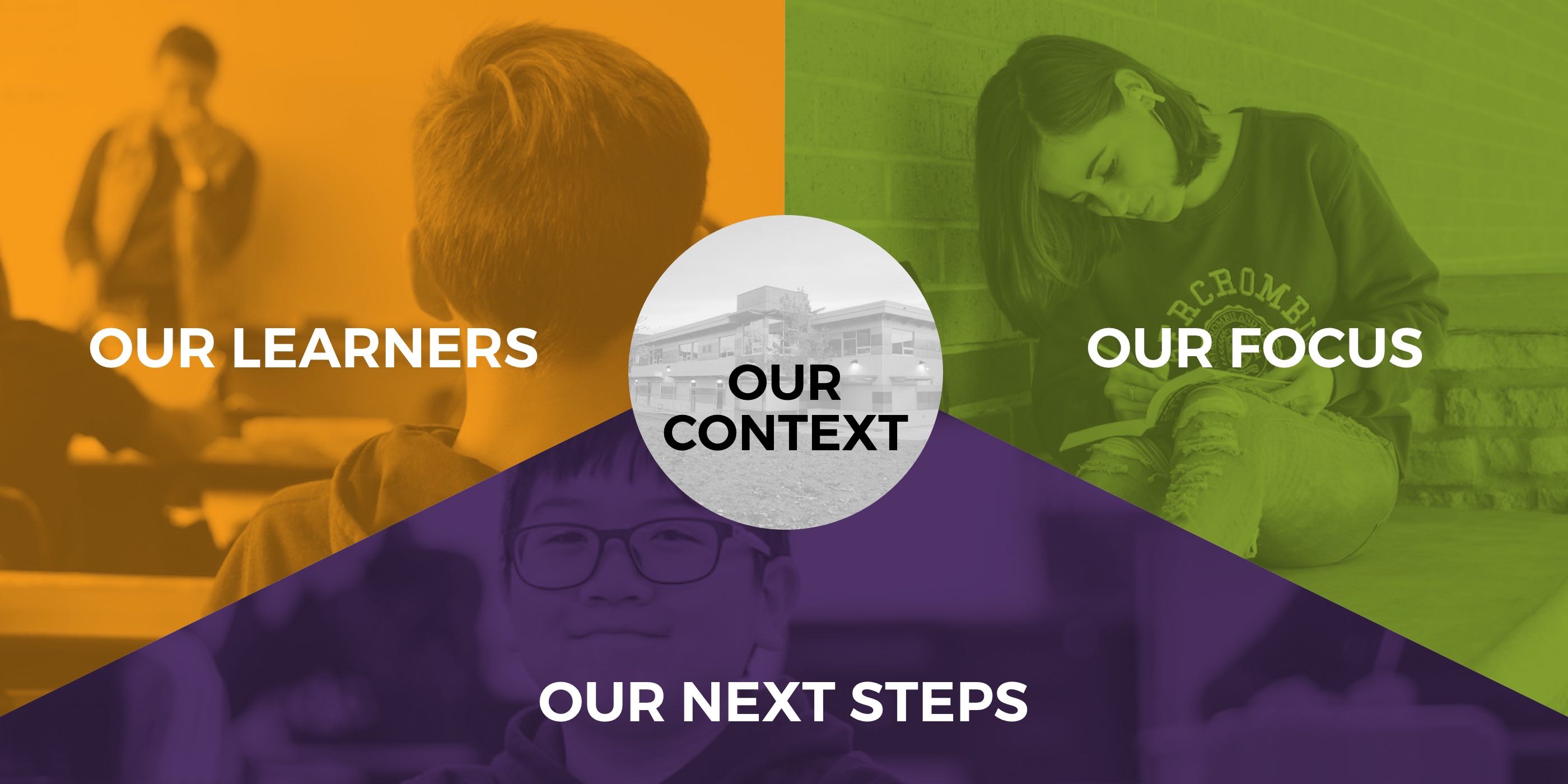

OUR CONTEXT
OUR CONTEXT
Welcome to North Surrey Secondary School! I’m Stefan Stipp, the principal.
When you enter our school, you'll immediately sense the warm embrace of a community that thrives on diversity, inclusion, and kindness. 61 different languages are spoken in the homes of our students. Here, every individual is valued, and every heart is welcomed into our community. We strive to create a deep sense of belonging for all Spartans.
Academics matter at North Surrey, reflecting our dedication to nurturing intellectual curiosity and sound thinking. We want students to be able think like historians, writers, scientists, and mathematicians in preparation for their transition into an everchanging world of complexity.
Artistry thrives in our Fine Arts program, where music, dance, visual arts, and drama flourish. This creative haven provides a platform for self-expression, allowing students to explore their passions and talents. Come visit our school to see our students shine through beautiful art displays, engaging concerts, dynamic dance performances, and powerful plays.
In our well-equipped workshops, innovation and craftsmanship come alive. The robust Technology Education program offers hands-on experiences in various fields, from woodwork and metalwork to robotics and automotive technology, empowering students to translate imaginative ideas into tangible realities.
The culinary, foods and textiles programs provide students with opportunities to develop life skills needed to prepare food and clothing. They help students understand how their choices as consumers can be more sustainable, can contribute positively to the environment and can work to help combat some social issues.
Our Business Education, Information Technology, and Career programs equip students with vital skills for the professional world. Students learn about computer programming, video game design, economics, and entrepreneurship, while also gaining insights into personal finance, marketing, photography, and video production. Our career education programs guide students in exploring careers, future education opportunities, and developing skills.
Physical activity plays an integral role in promoting well-being and teamwork. At North Surrey, students build skills in a varies athletic pursuits to build life-long habits of staying active. Our many sports teams allow students to engage in healthy competition, develop discipline, and embrace the values of perseverance and collaboration. Come watch our Spartans compete.
Our Modern Languages department offers students the opportunity to count themselves amongst the hundreds of millions of French and Spanish speakers globally. Throughout their years of study, students express themselves verbally and in writing with ever increasing fluency and confidence, all while learning about the world in which these languages are spoken, and finding their place in it.
The Library Learning Commons is a welcoming space for all our learners to embrace and explore their passions, interests, and needs. With a carefully curated collection of diverse resources the LLC strives to engage all members of our school community.
We focus on the Core-Competencies of communication, thinking and personal/social through thoughtfully planned activities and celebrations with subsequent reflections through out the year.
We have four caring counsellors to help students with course planning, and any personal issues that may arise.
We work hard to foster an inclusive learning community that ensures all students have the opportunity to grow and thrive at NSS. We support all students and their unique learning needs by tailoring their educational experience to individual needs.
As you walk through the halls of our diverse high school each student and staff member contributes a unique thread to the tapestry of our collective identity, and together, we form a dynamic and harmonious community.
OUR LEARNERS
To best serve our learners at NSS, we have engaged in a school wide inquiry process. First we created three relevant goals:
- Make meaning out of text,
- Problem Solving throughout the design process, and
- Nurturing creative expression and participation.
These goals work for NSS students because they’re broad enough so that each department in our school can engage in meaningful inquiry to improve student learning. They are congruent with the core and curricular competencies ensuring that the various inquiries are rooted in foundational goals of the BC curriculum.
With the goals established, each department worked to create an inquiry question which they have worked on (and in many cases refined) for the past two years. The table below shows the questions our departments worked on during the 2024 - 2025 school year.
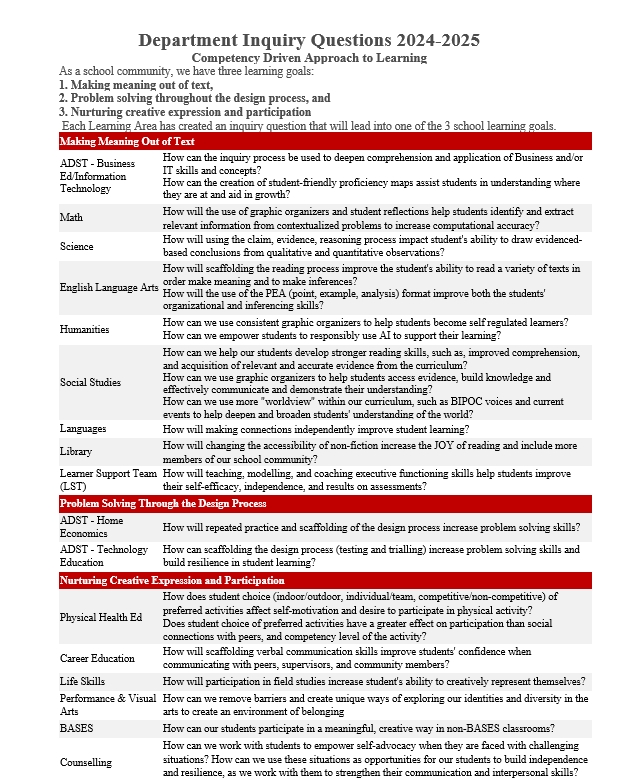
Here are some examples of student progress related to the various departmental inquiry questions:
Our Home Economics department has been inquiring into how repeated practice and scaffolding of the design process increase problem solving skills. Teachers have seen improvement in students self-regulated learning by using a consistent graphic organizer based on the design process throughout the year which students keep in duo tangs to stay organized. Rather than just following recipes, students are thinking about the process of cooking/ baking in terms of the design process. They are also reflecting on the process which leads to further improvements in their design thinking.
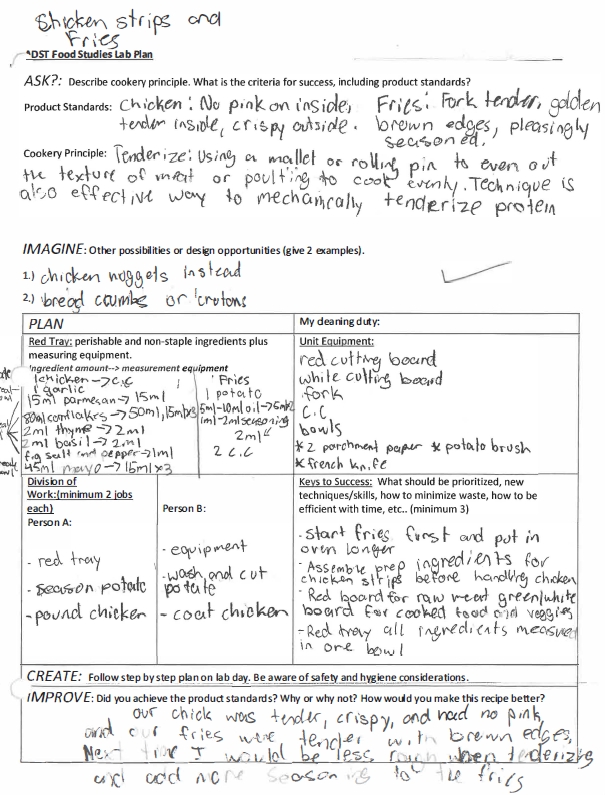
Another example comes from our Fine Arts department and is about nurturing creative expression. The department’s inquiry question is: How can we remove barriers and create unique ways of exploring our identities and diversity in the arts to create an environment of belonging? Performances by our dance classes and teams, theatre company, band and choir have been inspiring evidence of the strong sense of belonging shared by our artists. The students joy showcasing their art and their sense of connection to each other while creating something beautiful together are palpable each time.
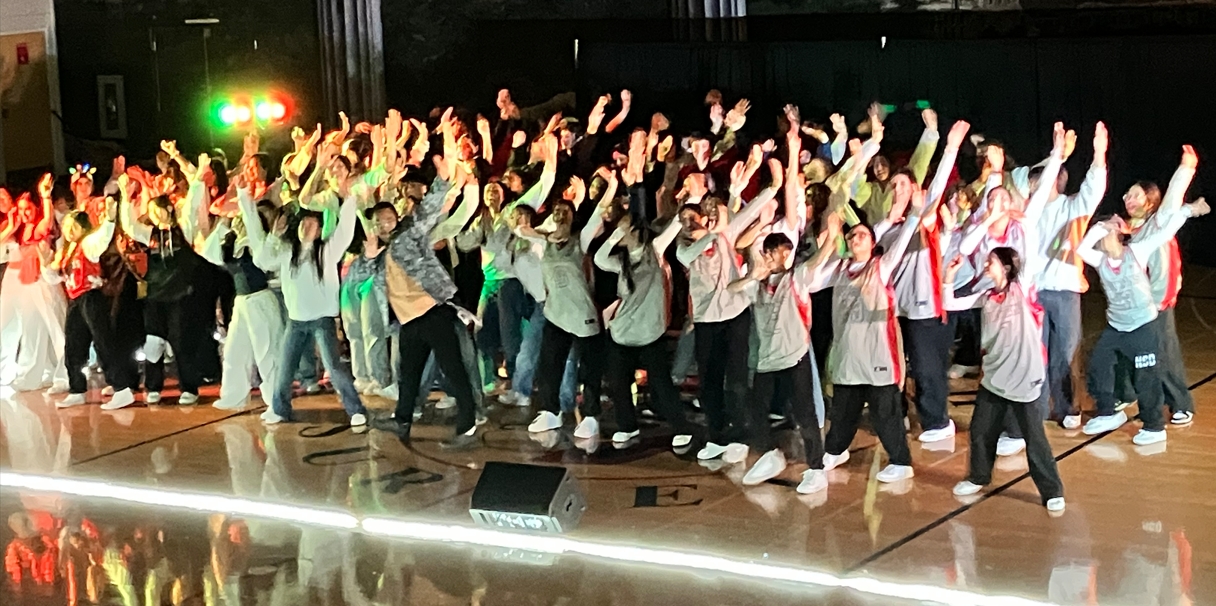
A final great example of exploring identity and diversity in the arts comes from the mural created by one of our Indigenous students. She proposed creating a mural as her parting gift to our school and it’s magnificent. A highlight of the year was the unveiling ceremony which brought our school community together in celebrating her work and Indigenous culture.
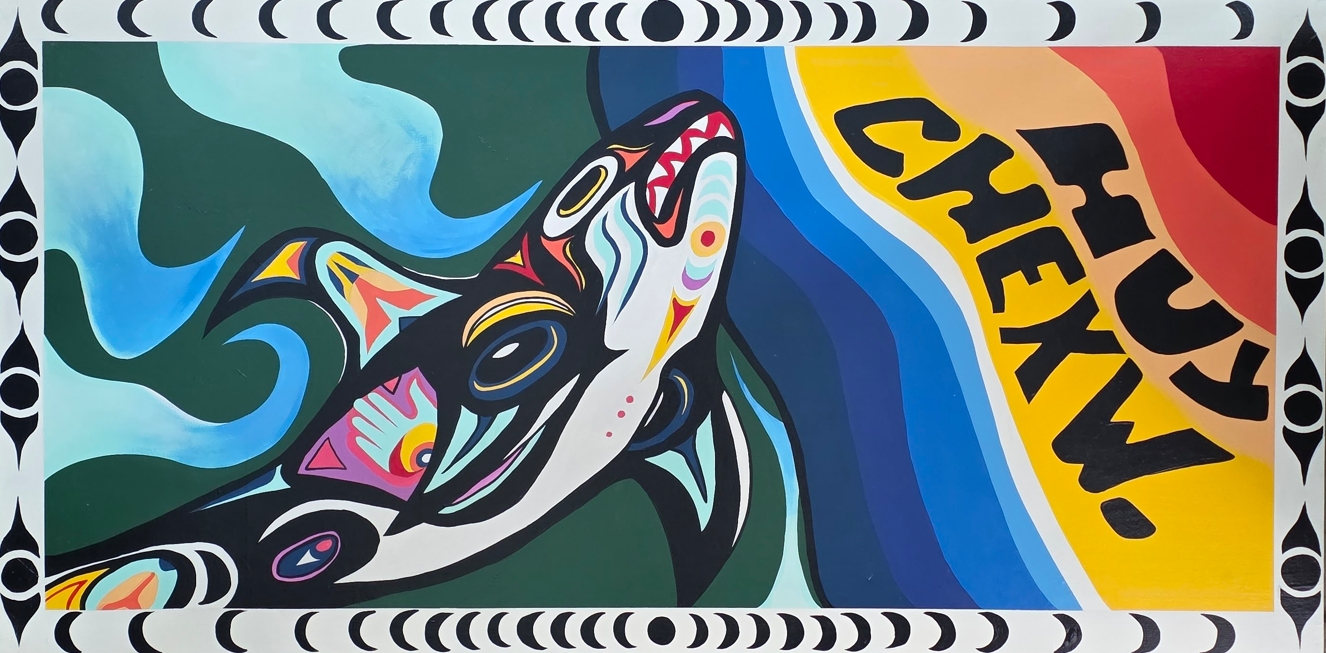
That's just a small sampling of the ways our staff and students are working towards our goals.
OUR FOCUS
Our Focus
The previously mentioned goals and inquiry questions represent the big picture of our staff working to improve student learning. Our targeted goal for this year's Student Learning Plan continues to be making meaning out of text.
This goal is important because being skilled at making meaning of text applies across the curriculum and in the real world. Whether it’s instructions on how to build an Ikea shelf, a science textbook, dialogue in a play to be performed, or Canada’s income tax rules, making meaning of text is essential.
This year we chose to focus on Math 8 and 9 classes. The goal was shifted slightly from making meaning of text to creating text to make meaning. Our math teachers have been shifting to an approach emphasizing curricular competencies. For this inquiry their focus were the following competencies from the Math 8 and 9 curriculum:
- Use mathematical vocabulary and language to contribute to mathematical discussions
- Communicate mathematical thinking in many ways
- Apply appropriate strategies to comprehend written, oral, and visual texts, guide inquiry, and extend thinking
- Reflect on mathematical thinking
Specifically, our Math department focused on: “How will the use of graphic organizers and student reflections help students identify and extract relevant information from contextualized problems to increase computational accuracy?
Math teachers focused on having students complete curricular competency checks after each unit. In these checks, students had to demonstrate their progress on a specific curricular competency by showing their thinking and reflecting on the process. Two teachers collaborated to develop a series of eight competency checks which students completed throughout the Math 8 and 9 courses.
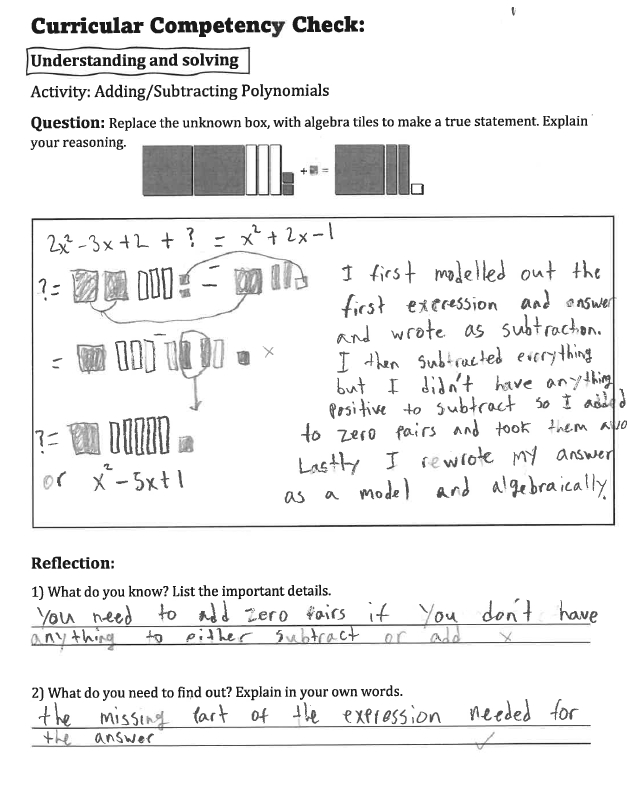
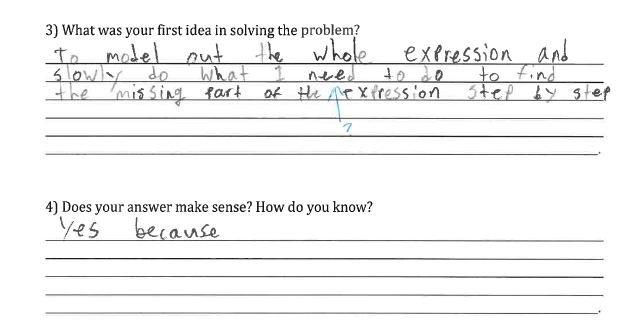
The above example shows the student has significant misconceptions. When looking at the student's attempts to write out his thinking, the teacher could quickly determine what he needed help with and address it.
The next example shows better thinking:
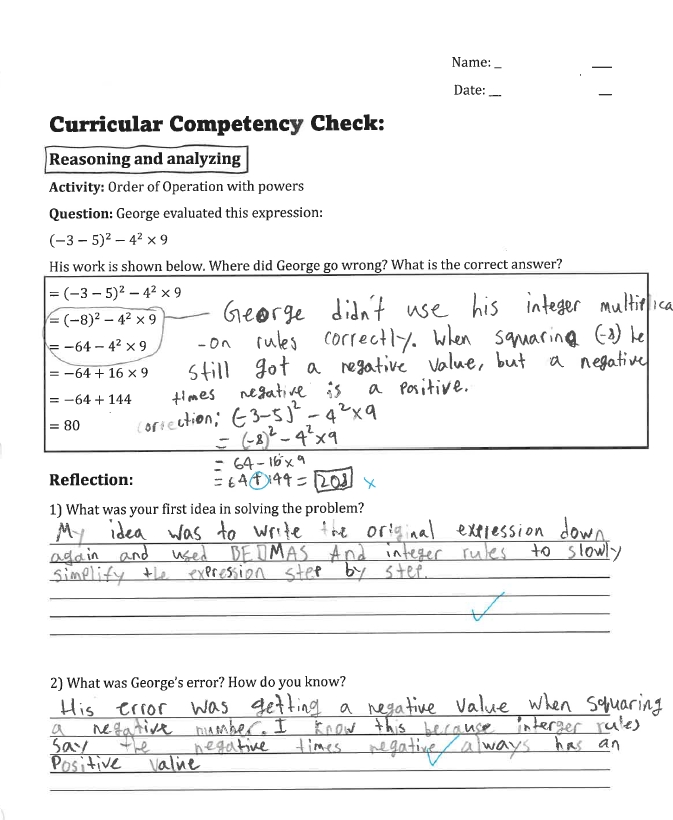

These reflections required students to make their thinking visible. The process of doing that led students to clarify and deepen that thinking. Furthermore, it helped the teacher support the students because it was easy to see where things went wrong. Because these reflections are directly based on a specific curricular competency, the teacher can help the student improve on the most important skills in the course.
OUR NEXT STEPS
Evidence
While different teachers individualized their approaches, the entire department was on board in implementing these instructional practices and the results have been promising. Math teachers report a significant improvement of their students’ ability apply the competencies and to articulate their mathematical thinking. Students are going beyond just computation. They’re gaining deeper understanding of the reasoning behind their solutions. Teachers noticed steady improvement of students on these competency checks throughout the year as they continued to practice. Just over 60% of students showed improvement of at least one gradation on the provincial proficiency scale.
The following rubrics show one student's progress on different curricular competencies in Math 8 over the course of a school school year.



Next Steps
Not all students made progress on their curricular competencies through these reflections. Math teachers plan to continue with this work and to provide more opportunities for students to show their growth after the reflections.
